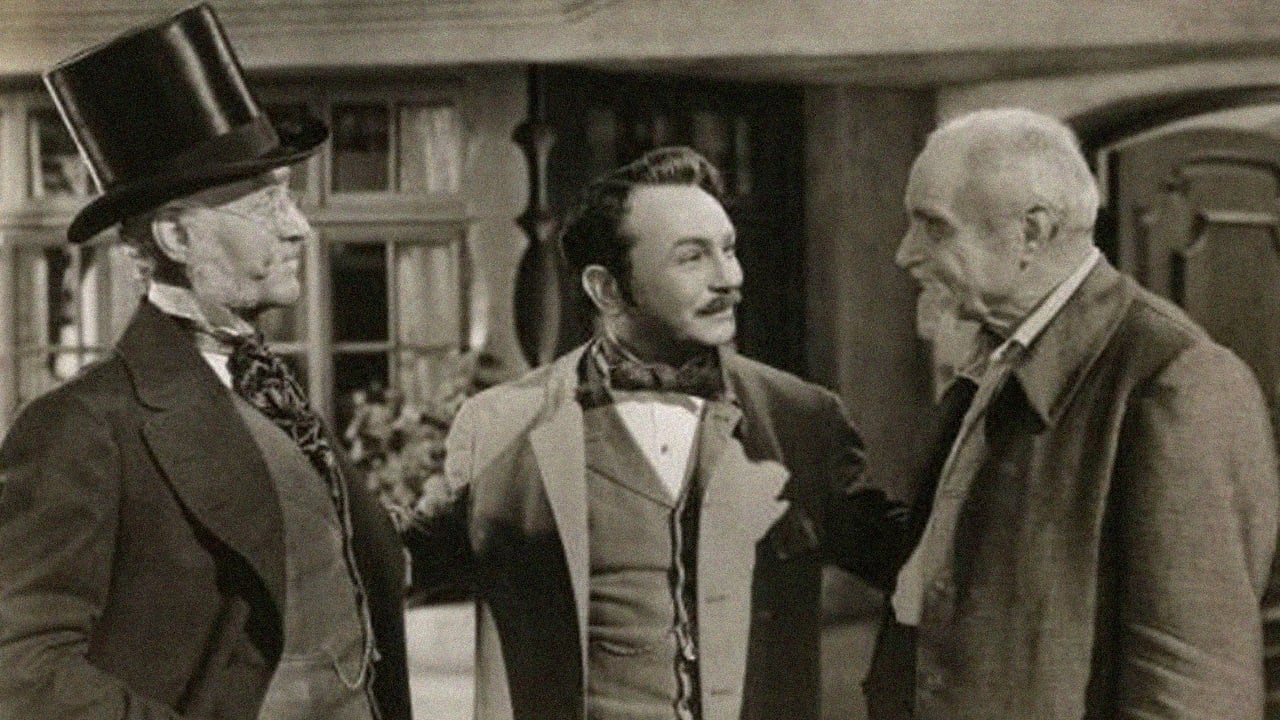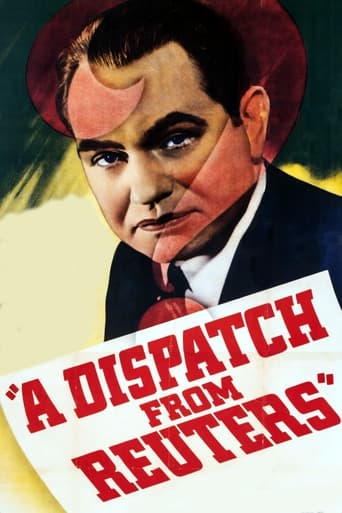

Lack of good storyline.
... View MoreThe movie turns out to be a little better than the average. Starting from a romantic formula often seen in the cinema, it ends in the most predictable (and somewhat bland) way.
... View MoreThere is, somehow, an interesting story here, as well as some good acting. There are also some good scenes
... View MoreGreat movie. Not sure what people expected but I found it highly entertaining.
... View MoreI saw this again the other night after many years and was impressed at how entertaining it was. It moves at a cracking pace (so typical of Warner Bros style) and has a great cast of fine character actors (especially Albert Bassermann, Nigel Bruce and Otto Kruger) supporting Edward G Robinson in the title role, who gives a nicely understated performance.The telescoping of events and the dramatic license with facts are to be expected in a film from this period, and in the main, the film presents a stirring account of how the transmission of news grew in the 19th century. Some reviewers here criticise Warners for not mentioning Reuter's conversion from Judaism to Christianity but anyone thinking a Hollywood studio would tackle such a complex subject in 1940 is expecting far too much. The direction by Dieterle is first rate and the pace is brisk, with the hand of Hal Wallis very obvious in the snappy editing and excision of any superfluous material.Much was made on the historical accuracy of the sets such as the London Stock exchange) and certainly, the recreation of the House of Commons in London while smaller than the real thing, looked very convincing.There is much else to enjoy here if you are a movie buff of Warner films from this period. When Reuter & Max are walking through the city near the beginning, we see many of the famous standing sets on the Warner back-lot at the time, including :- the Casa di Bonnyfeather and canal at Leghorn (built for Anthony Adverse): the large church structure built circa 1930, with the pillars & big flight of steps that featured in so many films including The Roaring 20s (Cagney dies on those steps at the end) and Deception (Bette Davis runs up those steps at the beginning) and we even see the large Nottingham Castle Gate with portcullis built for The Adventures of Robin Hood in 1937. Some of these sets were still standing as late as 1975! Above all, there is Max Steiner's terrific score. This tale clearly resonated in him and he produces one of his most arresting and dramatic works, with a superbly heraldic Main Title which reappears throughout at key points of the story, and also Steiner's most gorgeous waltz (for Reuter's wife played by the lovely and underrated Edna Best) that betrays his Viennese background. Steiner's score for REUTER cries out for a modern recording, yet few ever mention it when discussing his work for films.I think it is one of his finest, the equal to Now Voyager, All This & Heaven Too and Big Sleep. If the film were shown more, maybe it would be noticed by the CD companies.So, while this may not be the greatest of the Warner bio-pics, it is certainly unjustly overlooked. Let us hope it reaches DVD soon.
... View MoreEdward G. Robinson was a most interesting movie star in classic film history. Like Bogart, James Cagney, and Spencer Tracy, he was a character actor who became a leading man. That didn't and doesn't happen to many actors or actresses. Robinson could do anything - he could be mean, pathetic, a blowhard, a loser, hilarious, whatever the role called for. Along with his Warners colleague, Paul Muni, he did his share of biopics. "A Dispatch from Reuters" from 1940 is one.Robinson plays Julius Reuter. Since this film is really about the news agency he founded, much of Reuter's life is left out. Of interest, he was a German Jew who moved to London and ultimately converted to Christianity (before marrying Ida, who was a Christian), taking the first name of Paul. He also became a naturalized British citizen and was named a Baron by Queen Victoria. He had three sons, and the last member of the Reuter family, the widow of one of his grandsons, died in 2009.Anyway, to get back to the film - there was some dramatic license taken, but the basic story is accurate. Reuter did start out with carrier pigeons, and the film does follow the evolution of the agency accurately as far as his news beating the ships, etc.Edward G. Robinson is excellent as Julius, and though it's unclear how much of a struggle the real Reuter had in getting clients, Robinson shows determination and ambition throughout the film. I have to agree with one of the reviewers on this site who thought the Eddie Albert character was too lazy to have continued to be employed. Albert is good, though, as is the rest of the cast -- Albert Basserman, Edna Best, Gene Lockhart, Nigel Bruce, Otto Kruger, and Montagu Love.Entertaining film.
... View MoreA Dispatch From Reuter's was the second of two biographical films that Edward G. Robinson did while at Warner Brothers. Previously those prestige roles were reserved for Paul Muni and Robinson acquits himself well both as Dr. Paul Ehrlich in Dr. Ehrlich's Magic Bullet and now as Julius Reuter. The former film however is far better.Julius Reuter had a fascinating story to tell, but a lot was left out of this movie. For one thing, Reuter was born Jewish and converted to Christianity. I'm not sure how well that stood with Jack Warner as a Jew, but Jack Warner the film maker who did items like Confessions Of A Nazi Spy was not about to send that kind of message out in 1940 to his audience. One does wonder just what did attract him to the Reuter story.Reuter, first with the use of carrier pigeons and then with the telegraph, developed wire service reporting as we know it. Technology be it animal or human did fascinate him. He understood that news was power, fortunately if he was anything he was honest. A more unscrupulous individual might have caused great harm. One also wonders how Reuter would have viewed the internet in these days. The story begins when Reuter was a juvenile in the 1820s and ends in 1865 with Reuter a successful individual in the news business. Reuter lived another 34 years and in that time was involved in some imperial schemes, certainly in keeping with the times, but would not be viewed well today and again not a message Jack Warner wanted to convey in 1940.Edward G. Robinson is fine as the dedicated Reuter with Eddie Albert in the sidekick role and Edna Best not having to do much, but be loyal and supportive as Mrs. Reuter. It's not quite up to the level of the Muni biographical films, nor as good as Dr. Ehrlich's Magic Bullet, but entertaining enough though it barely touches on the real Reuter.
... View MoreAt the time ,Robinson used to play illustrious men (what Greer Garson did for illustrious women):Reuters and Ehrlich.Both movies were released the same year ."Reuters" is certainly less interesting than "Ehrlich" although the endings are similar (both heroes stand accused and get final vindication)."Reuters" marks the beginning of what we call today the global village .It's a long way from Reuters' pigeons.That said,neither "Ehrlich" nor " Reuters" are among Dieterle's great works.They are certainly interesting ,but impersonal :if you want to discover a great director,you'd better choose "portrait of Jennie" or "the hunchback of Notre Dame".
... View More